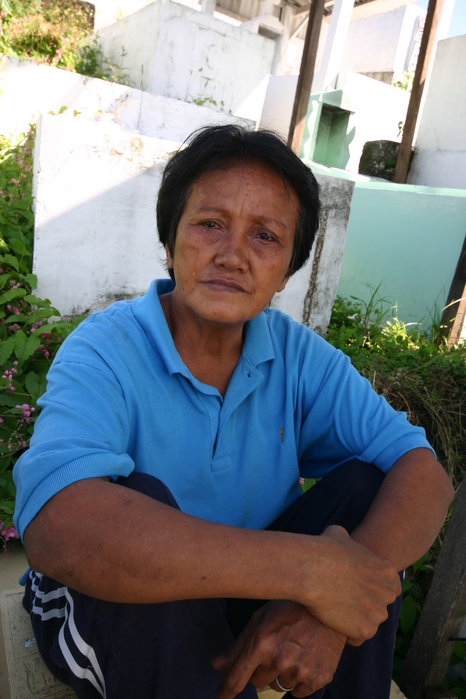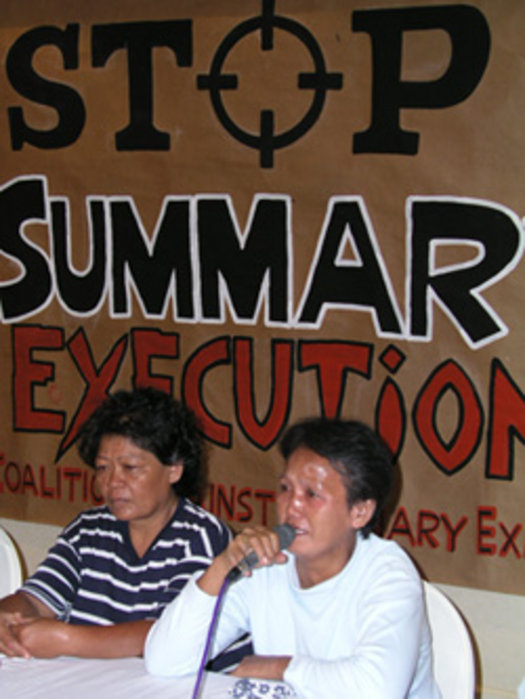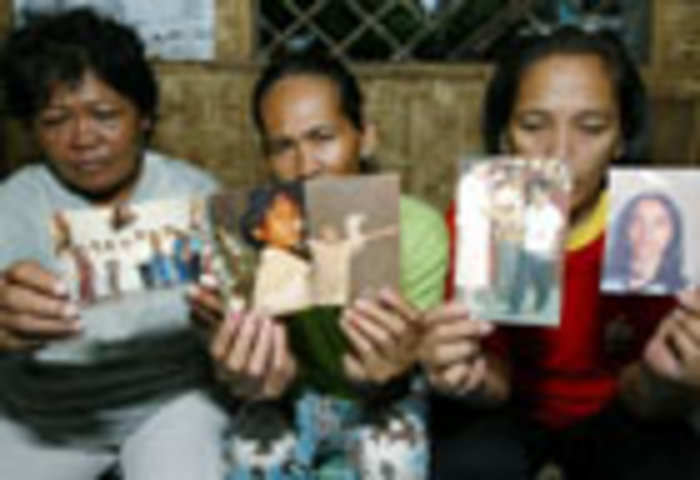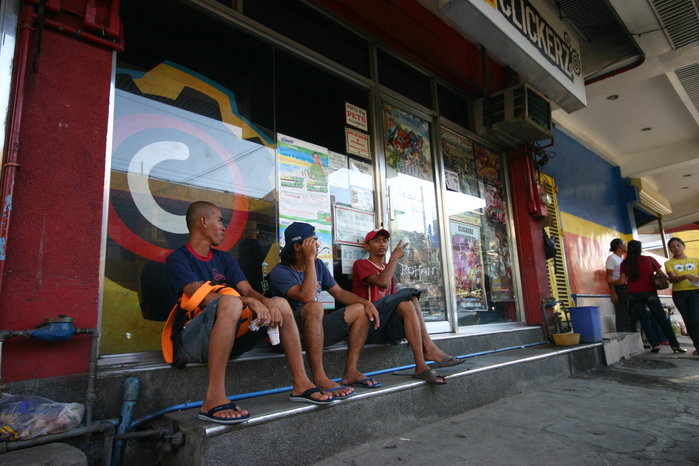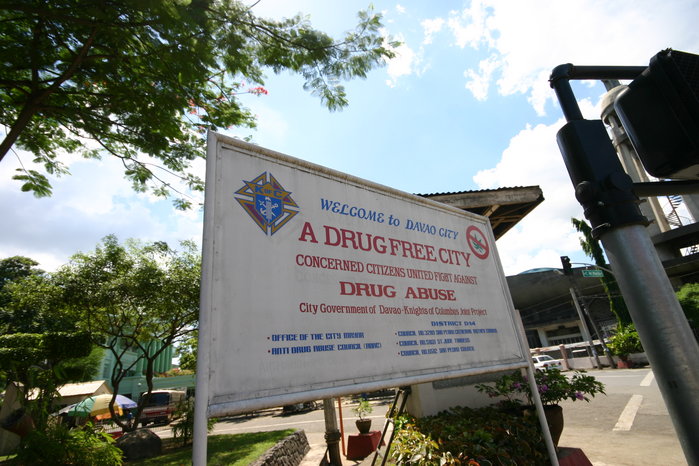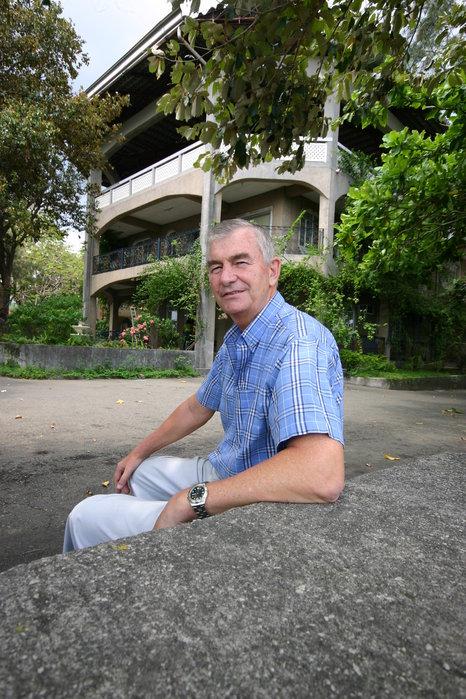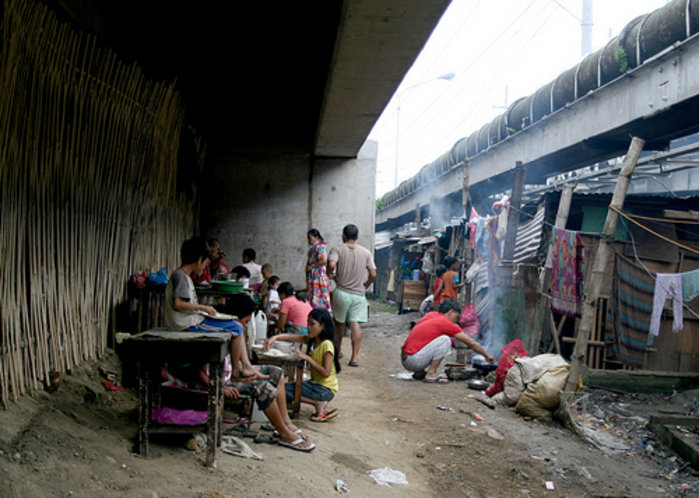The Terminators. Police Death Squads in the Philippines
Police death squads are out of control in The Philippines say human rights campaigners, murdering slum children, the poor and political enemies with impunity.
David McNeill in Davao, The Philippines
They came to kill her children one by one. First was Richard in 2001, then his brother Christopher. Bobby was taken from her the following year, and Fernando in 2007. Now Clarita Alia lives in fear that Arnold, her last remaining son is next. And far from protecting her shattered family, it is the police who are behind the killings, she says.
“The police said, ‘We will take your sons one by one,’” recalls the 54-year-old grandmother at the graveside of her murdered brood in the southern Philippines city of Davao, the largest city in Mindanao. “They may kill me too, but I am not afraid to die. I’m already old.”
Clarita Alia in the paupers graveyard where her four sons are buried. She believes they were murdered by police-run death squads.
Insects hum in the humid tranquility of this pauper’s graveyard. Below, the city of 1.3 million people, a tourist hub for some of the most spectacular scenery in Southeast Asia, sprawls toward the Pacific. Mayor Rodrigo Duterte boasts that he has made this the safest urban zone in the country, but Davao’s motto: ‘love, peace and progress’ is belied by an ugly killing spree that has claimed nearly 900 lives, including dozens of children.
Mayor Duterte
The mayor says they all deserved to die. “What I want to do it so instill fear,” he told reporters in February. “If you are doing an illegal activity in my city, if you are a criminal or part of a syndicate that preys on the innocent people of the city, for as long as I am the mayor, you are a legitimate target of assassination.” Duterte, says the Philippine Daily Enquirer, rules over a city “with the highest number of gangland-style killings in the country.”
Condemnation and press coverage has failed to stop summary executions of what Mayor Duterte calls “society’s garbage,” Davao’s own slum dogs: alleged petty drug dealers, young toughs and street children. Vigilantes have murdered 894 people in the last decade, including at least 80 minors, according to the Tambayan Center for Children’s Rights, a Christian NGO that operates in Davao’s city center. It is the only organization keeping a systematic account of the executions. The youngest victim was 12 years old.
Protesters call for end to slayings
And the pace of killings is increasing: 57 people were stabbed or shot in the first three months of this year alone, up from 2 in the whole of 1998. The killers escape arrest thanks to the tolerance and sometimes “outright support of the local authorities,” says a new report on the killings on Davao’s Death Squads by the US-based Human Rights Watch. “Impunity for such crimes is almost total,” it adds.
Officially sanctioned vigilantism is spreading as the country’s economic woes deepen, warns Edith Casiple, Tambayan’s executive director. “The problem is now all over the country. Other leaders are copying Mayor Duterte.” In several cities, including the capital Manila, politicians have praised Davao’s style of rough justice. Activists, trade unionists and newspaper reporters have been added to the assassins’ lists; only Iraq is a more dangerous place for journalists, says the France-based media watchdog Reporters Without Borders.
Police officers in collusion with local city governments across the southern island of Mindanao are involved in the targeted killings – known in the local press as “salvagings” and “rub-outs,” say human rights groups. Executions have also been reported in the troubled holiday resort of Cebu and in Manila. Philippine President Gloria Macapagal Arroyo, who once appointed Duterte as an advisor on peace and order, has “largely turned a blind eye” to the murders, claims Human Rights Watch (HRW).
“In the face of evidence pointing to local government involvement in these murders, President Arroyo’s continued silence could be seen as tacit acceptance of death squad killings,” Elaine Pearson, deputy Asia director of HRW said in a statement this year. If she is serious about shutting them down, “now is the time for her to speak out, press for prosecutions, and announce measures to help victims’ families.”
Davao women hold photographs of missing or dead sons
Death squads are not new in The Philippines and go back at least to the dictatorship of Ferdinand Marcos, whose supporters in the army and police often preferred to kill opponents than negotiate with them. The tactic reached a peak during the 1970s and 80s, when the Marcos dictatorship fought a bloody war with the Maoist New People’s Army (NPA) while cracking down on student and labor movements.
Before being toppled in 1986, Marcos radicalized a generation of young Filipinos with his heavy-handed tactics of branding progressive and anti-poverty movements ‘communist.’ The tactic, backed to the hilt by successive US administrations, including Marcos’ famous friend President Ronald Reagan, accelerated after Martial Law was declared in 1972. It had the effect of pushing thousands of peasants, workers and students into the NPA ranks.
Davao became “the laboratory” for the NPA’s armed insurrection. Squads of NPA guerillas assassinated police officers, military officials and civil servants. The state retaliated in kind with its own kidnappings and killings. By the middle of the 1980s, the city had descended into semi-anarchy, say locals, fuelling the rise of strongmen like Duterte, who promised to clean up the mess.
Although the NPA campaign peaked long ago, low-level conflict persists. In the aftermath of the 9/11 attacks on the US, Washington declared the NPA a terrorist organization, a cue for more state dirty tricks. In March this year, the 21-year-old daughter of NPA local commander Leoncio Pitao was stabbed to death by assassins. Rebelyn Pitao was a trainee teacher with no criminal record or known association with her father’s organization. Observers suspect she was murdered by military or police agents.
The executions follow a similar pattern. Police officers or government officials from barangays – local administrations – approach alleged troublemakers to warn that they have made a hit list known as the “order of battle” or, in Davao, “Duterte’s list.” Failure to heed the warning by quitting “illegal activities” or leaving town is a sentence of death, usually carried out by men on motorbikes carrying butcher’s knives or .45-caliber handguns.
The vigilantes have achieved their purpose: instilling terror in the city’s slums, says Renante Ventula (25), who lives on Davao’s streets. “When we talk about them, we do so in low voices because we don’t know who is listening.” Last October, he says his friend was murdered in a local Internet café. “He had been warned by the San Pedro (city center) police. Two men arrived on motorbikes without license plates, went into the café and took turns stabbing him. He had ten stab wounds.”
Davao internet cafe in which at least one teenager was stabbed to death by death squads
When the cops arrive at the scene of such executions, they ignore investigative procedure and fail to interview witnesses, claim observers. Few of the killers have been caught and not one of the murders has been condemned by the city’s mayor, who used to read out the names of “troublemakers” on his weekly TV show. The vigilantes, who are sometimes recruited from the ranks of petty criminals, are guided by police officers or ex-police, known as amo, or bosses, says Human Rights Watch. Killings are often subcontracted; by the time they reach the street, they can reportedly be done for as little as 350 – 500 pesos.
Police spokesman Doble Rogelio denies the claims. “We are trying our best but there are no witnesses to the killings,” he said, the now standard police response to accusations that they are not doing enough the catch the culprits. The San Pedro station where he works is festooned with religious imagery: a portrait of Jesus Christ adorns the hallway and a huge placard quoting the prophet Jeremiah stands at the entrance. Officer Rogelio says he has heard of Clarita Alia’s murdered children. “The Alia family was a notorious clan, frequently engaged in rioting. They were apprehended many times. Perhaps their mother has hatred toward the police.”
Local businesses claim the murders have made Davao a safer destination for the thousands of tourists who visit here annually. “Duterte is very popular here, explains Emily Lawas-Juausengpue, owner of a city center restaurant. “If you are not a criminal, you have nothing to fear.” The mayor, who has been elected four times, has been dubbed “Dirty Harry” in some of the Filipino press. Photographers often snap him holding a shotgun or sitting on the powerful motorbike he uses to ride to work.
Welcome to Davao City
Can the central government influence events in Davao? As late as April, Malacanang Palace, the president’s official residence, publicly told Duterte that he should regain control over the city police force, and rejected talk of an investigation into the killings. “The mayor is an elected official. We can’t act on something that is not based on actual facts on the ground,” said government spokesman Eduardo Ermita. Observers say Duterte is beyond the reach of the president, who has distanced herself from him. “He is well protected politically and therefore untouchable,” said Irish priest and human rights campaigner Shay Cullen
Shay Cullen
Cullen, who has lived in The Philippines for four decades, reacts angrily to suggestions that the victims deserved to die. “These are not criminals. They’re children who have never been convicted of anything.” A decade ago, he was sued for libel by Davao’s previous mayor after he started a letter-writing campaign to halt the death squads. “It was a scary time because I could have been assassinated myself.” He says the growing annual death toll shows people like Mayor Duterte are now “out of control.” “Who can prosecute him? Only the World Court.”
Years of pressure by campaigners like Father Cullen seemed to pay off this year when the Philippine Commission on Human Rights held a three-day hearing on the killings in Davao in March. “Children are being executed,” Chairperson Leila DeLima told the press. Most alarming, “is the growing culture or mentality of acceptance of the executions…this is worse than apathy and indifference,” she warned, calling them “selective vigilantism” that targeted the poor and left big-time criminals untouched.
Mayor Duterte lived up to his gung-ho image at the hearing. Asked by DeLima what he would do if he captured a member of the shadowy death squads operating in his city, he intoned: “If I catch you killing someone, I will shoot you in front of the people.” The commission found him accountable for the murders on his watch. Duterte quit his supervisory role over the police force in April, but most observers believe he is still the city’s political kingpin.
“The hearings were just a game by the government, to show that something is being done,” spits Clarita Alia, who testified to the commission about her experiences. In the rancid one-room hovel where she lives, oldest son Arnold dozes on the only bed, next to her baby grandchild. She raised her seven children here in the teeming city markets of Bankerohan, where she sells cigarettes on the street for a living. None of her children finished primary school and some drifted into petty crime. When the police came for Richard, they say he had already been arrested ten times. “I fought with them,” she recalls. “They didn’t have a warrant and I told them they couldn’t take my son. And the senior policeman said: ‘OK, watch out because your sons will be killed, one by one.’”
Bankerohan slums
Richard was stabbed to death a few weeks later, aged 18. Christopher (17) and Bobby (14) were knifed within months of each other. In desperation, she sent Fernando to live out of the city. But after he returned, he was killed by the faceless assassins in April 2007, aged 15. Only Arnold remains, until the killers come again.
“It hurts every time I talk about it,” she says. “But I don’t have a choice because I want the world to know what happened to my children.”
This is a revised and enlarged version of reports that appeared in The Irish Times and The Independent. David McNeill writes for The Independent and other publications, including The Irish Times and The Chronicle of Higher Education. He is an Asia-Pacific Journal coordinator.
Recommended citation: David McNeill, “The Terminators. Police Death Squads in the Philippines,” The Asia-Pacific Journal, Vol 24-6-09, June 15, 2009.



